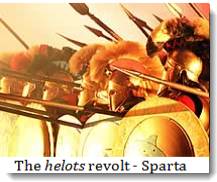Originally published on The Agonist
The mountains look on Marathon - / And Marathon looks on the sea; / And musing there an hour alone, / I dreamed that Greece might yet be free. - Lord Byron

The Greek parliament voted to approve this week what might justly be titled “The Debt Enslavement Act of 2011”. Under this act, everyone in Greece gets to be a helot, and how bad could that be? It’s not like the old days. In ancient Greece the youth of Sparta participated every autumn in the Krypteia, a sort of military training exercise in which Spartans would hunt down and kill helots without fear of legal reprisal. The helots were Greeks too, just the wrong kind of Greeks – lower class, servile, tied to the land. Slaves, in effect.
Modern day slaves aren’t tied to the land anymore – they are tied to their bank. So are governments, for that matter. How often have you read in the past few weeks that unimaginable economic consequences await us if Greece defaults? Angela Merkel said so. So did Nicolas Sarkozy, and now the new IMF head, Christine Lagarde, has said that the Greek opposition party needs to unite with the majority Socialist party to approve new tough austerity measures for the country. If they do, the IMF, the European Union, and the European Central Bank will release the last tranche of a previously-agreed loan. These three noble institutions, called “the Troika” by the press, are basically telling Greece “We are going to default on our loan commitments to you if you don’t deliver even more cutbacks, tax increases, asset sales, and unemployment than you previously promised.” The Troika, no doubt, does not enjoy trafficking in pain and suffering on a national scale, but apparently it is the only collateral they can get. The irony is, if Greece agrees to deliver more collateral – maybe we should call it collateral damage – they don’t really get any money. It just passes through Greece straight to the banks.
Recent comments